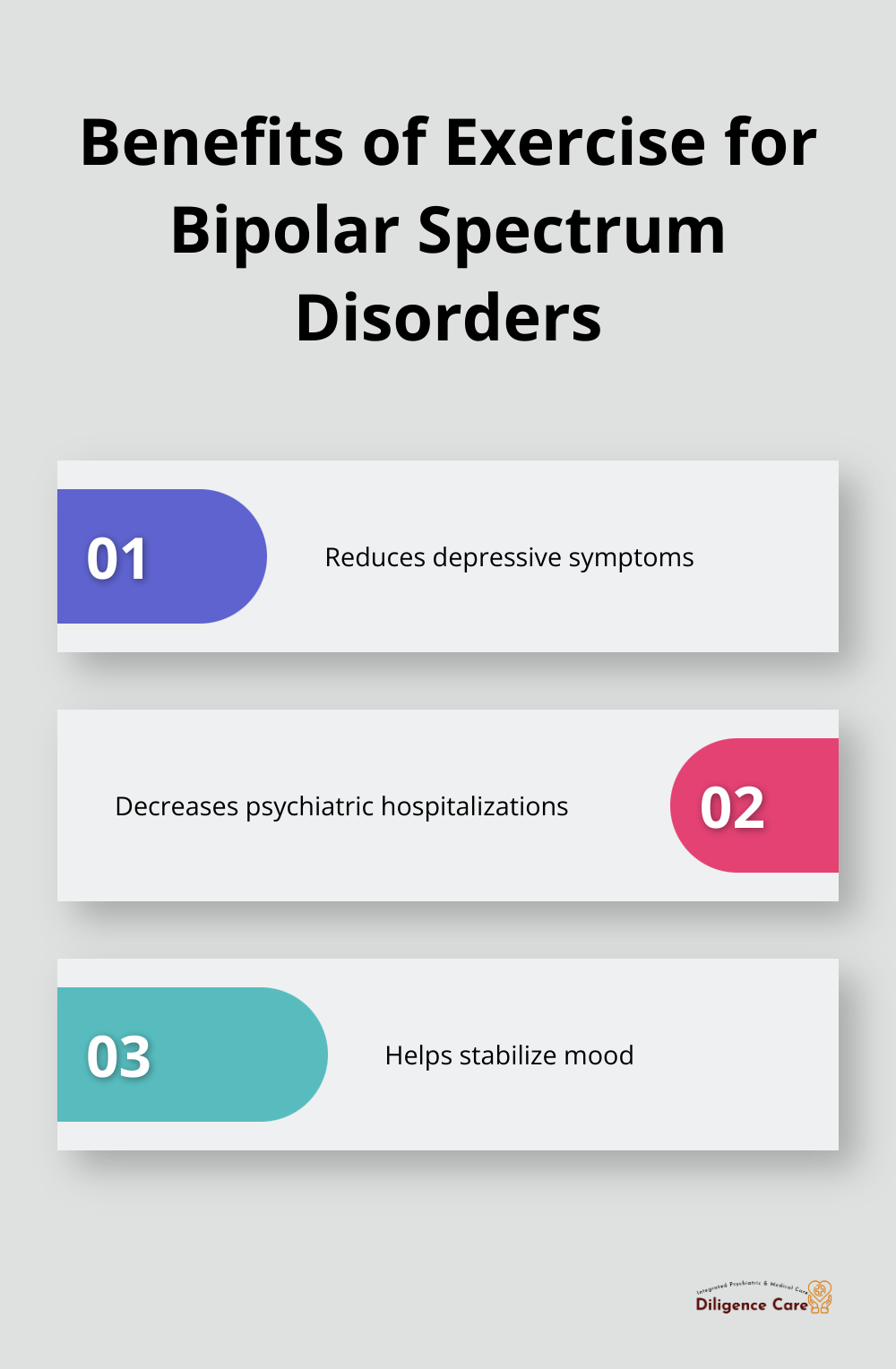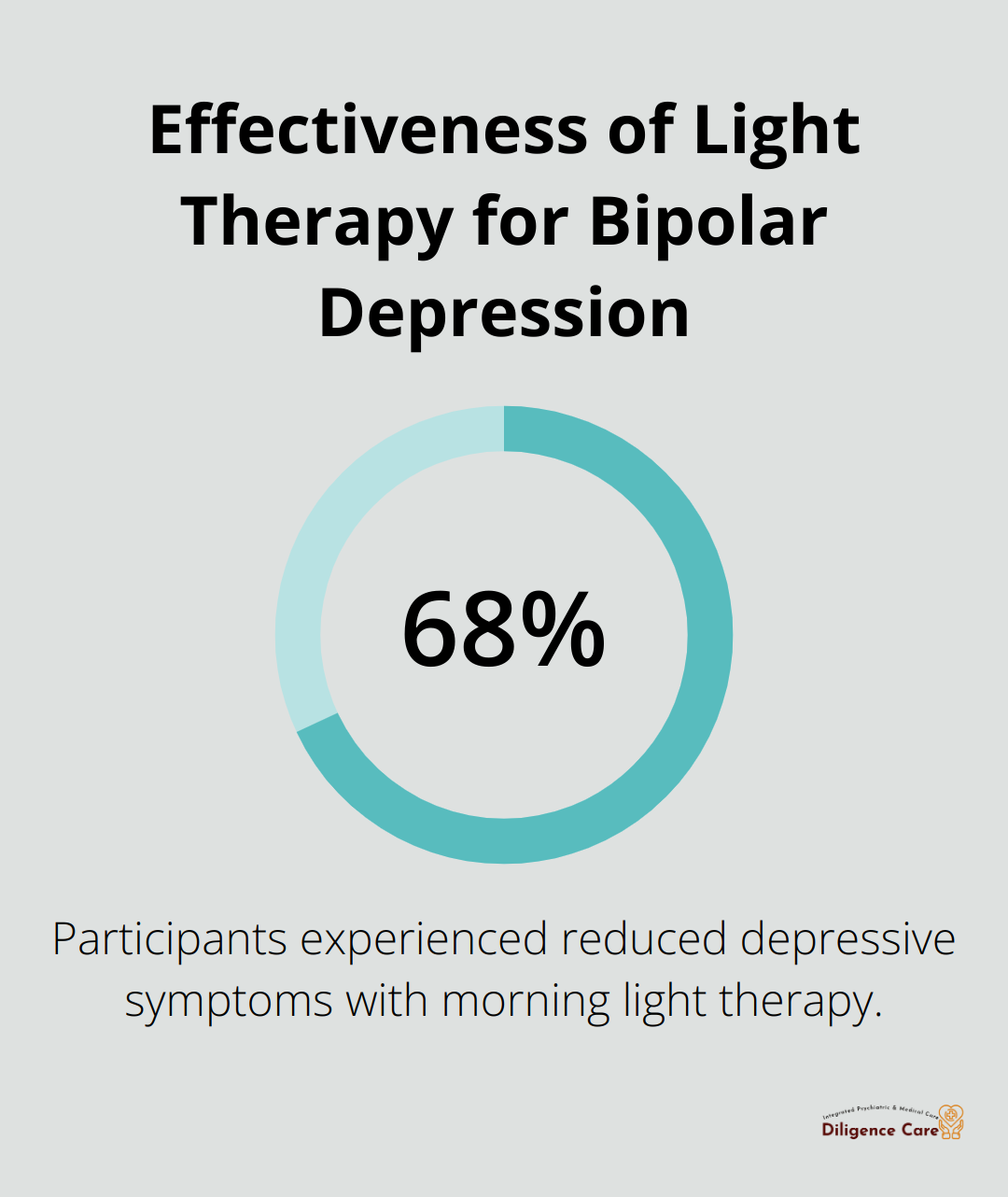
Managing Bipolar Depression Without Medication
Bipolar depression treatment without medication is a topic we often discuss with our patients at Diligence Integrated Care. While medication plays a vital role for many, some individuals seek alternative approaches to manage their symptoms.
This blog post explores non-pharmacological strategies that can help people with bipolar depression. We’ll cover lifestyle changes, psychotherapy approaches, and complementary treatments that may provide relief and improve overall well-being.
How Lifestyle Changes Can Help Manage Bipolar Depression
At Diligence Integrated Care, we emphasize the power of lifestyle modifications in managing bipolar depression. These changes can significantly impact mood stability and overall well-being. Let’s explore some practical strategies our patients have found effective.
Sleep: Your Mood’s Best Friend
A consistent sleep schedule is essential for bipolar depression management. Dr. Bolanle Oluwadara, MD, at Diligence Integrated Care, recommends a fixed bedtime and wake-up time, even on weekends. This regularity helps stabilize your circadian rhythm, which is often disrupted in bipolar disorder.
Try to get 7-9 hours of sleep per night. Create a relaxing bedtime routine: dim the lights, avoid screens an hour before bed, and try calming activities like reading or gentle stretching. If racing thoughts trouble you, write them down in a journal to clear your mind before sleep.
Move Your Body, Lift Your Mood
Regular exercise combats bipolar depression effectively. A systematic review revealed that for individuals with bipolar spectrum disorders, exercise is associated with a reduction in depressive symptoms and decreased psychiatric hospitalizations.

Start small – a 10-minute walk can make a difference. Gradually increase to 30 minutes of moderate exercise most days of the week. Find activities you enjoy (dancing, swimming, or yoga). Consistency trumps intensity.
Fuel Your Body and Mind
Your diet significantly impacts your mood. A balanced diet rich in omega-3 fatty acids (found in fish like salmon) can help stabilize mood. Consuming protein-rich foods is another excellent way to combat most bipolar disorder symptoms, according to Mental Health Connecticut (MHC).
Don’t skip meals, as this can lead to blood sugar fluctuations that affect mood. Stay hydrated and limit caffeine and alcohol, which can disrupt sleep and mood stability.
Stress Less, Live More
Stress often triggers bipolar episodes. Implementing stress reduction techniques is vital. Try mindfulness meditation – even 5 minutes a day can make a difference. (The Headspace app offers guided meditations specifically for bipolar disorder.)
Deep breathing exercises can quickly calm your nervous system. A 2018 study found that deep breathing exercises helped reduce anxiety in those with bipolar disorder. Anxiety and bipolar disorder are closely related.
These lifestyle changes can significantly improve your ability to manage bipolar depression. Everyone’s journey is unique, and at Diligence Integrated Care, we work closely with each patient to develop a personalized plan. While lifestyle changes form a solid foundation, many patients benefit from additional support. Let’s explore how psychotherapy approaches can complement these lifestyle modifications in managing bipolar depression.
Psychotherapy: Your Mental Toolkit for Bipolar Depression
Psychotherapy offers powerful tools for managing bipolar depression. At Diligence Integrated Care, we’ve observed the transformative effects of various therapeutic approaches. Let’s explore some effective strategies that our patients find helpful.
Cognitive Behavioral Therapy (CBT): Rewire Your Thoughts
CBT helps you identify and replace negative thought patterns with more balanced ones. Recent findings suggest that cognitive remediation can be an effective treatment approach for bipolar patients, aimed at enhancing their cognitive abilities, treatment outcomes, and overall functioning.
In CBT sessions, you’ll learn to:
- Recognize early warning signs of a depressive episode
- Challenge and reframe negative thoughts
- Develop coping strategies for difficult situations
Interpersonal and Social Rhythm Therapy (IPSRT): Stabilize Your Daily Routine
IPSRT focuses on stabilizing daily routines and improving interpersonal relationships. This therapy addresses the disruption of biological rhythms often seen in bipolar depression.
Key components of IPSRT include:
- Creating a consistent daily schedule
- Improving communication skills
- Resolving interpersonal conflicts that may trigger mood episodes
Recent studies have reported that interpersonal psychotherapy (IPT) can be an effective treatment for postpartum depression, focusing on relationships and social support.
Mindfulness-Based Cognitive Therapy (MBCT): Cultivate Awareness
MBCT combines mindfulness techniques with cognitive therapy. It helps you become more aware of your thoughts and feelings without judgment. This awareness can prevent negative thought spirals that often lead to depressive episodes.
Try these mindfulness exercises:
- Body scan meditation (focus on each part of your body)
- Mindful breathing (pay attention to your breath)
- Observing thoughts (watch thoughts come and go without engaging)
Family-Focused Therapy: Strengthen Your Support System
Family-focused therapy involves your loved ones in the treatment process. It educates family members about bipolar disorder and improves communication within the family unit. This approach can significantly reduce the risk of relapse.
A randomized clinical trial demonstrated significant reductions in depression, mania, and overall problem behaviour in adolescents receiving family-focused therapy for bipolar disorder.
Benefits of family-focused therapy include:
- Enhanced understanding of bipolar disorder among family members
- Improved family communication and problem-solving skills
- Reduced stress and conflict within the family
At Diligence Integrated Care, our team (including Dr. Bolanle Oluwadara, MD, and Bernadette Akpengbe, PMHNP-BC, FNP-BC) tailors these psychotherapy approaches to each patient’s unique needs. We work closely with patients to find the most effective combination of therapies.
While psychotherapy forms a solid foundation for managing bipolar depression, many patients benefit from additional support. Let’s explore how alternative and complementary treatments can enhance your mental health toolkit.
Exploring Alternative Treatments for Bipolar Depression
At Diligence Integrated Care, we recognize that managing bipolar depression often requires a multifaceted approach. While traditional therapies and lifestyle changes form the foundation of treatment, many patients find relief through alternative and complementary methods. Let’s explore some evidence-based options that may enhance your treatment plan.
Light Therapy: The Power of Sunlight
For those with seasonal patterns in their bipolar depression, light therapy can transform their treatment. This method involves exposure to bright, artificial light that mimics natural sunlight. A study published in the Journal of Affective Disorders found that morning light therapy reduced depressive symptoms in 68% of participants with bipolar disorder.

To try light therapy:
- Use a 10,000-lux light box for 20-30 minutes each morning.
- Keep a consistent schedule, using the light box at the same time daily.
- Place the light box at eye level, about 16-24 inches from your face.
- Avoid looking directly at the light; keep it in your peripheral vision while reading or working.
Always consult with your healthcare provider before starting light therapy, as it can potentially trigger manic episodes in some individuals.
Acupuncture: Ancient Wisdom for Modern Minds
Acupuncture shows promise in managing bipolar depression symptoms. Clinical studies have proven the therapeutic efficacy of acupuncture for treating 28 conditions, including depression, headache, knee pain, low back pain, and neck pain.

If you consider acupuncture:
- Find a licensed practitioner with experience treating mental health conditions.
- Expect treatments 1-2 times per week for several weeks.
- Be patient – it may take 6-8 sessions before you notice significant improvements.
- Communicate openly with your acupuncturist about your symptoms and any changes you experience.
Omega-3 Fatty Acids: Brain Food for Mood Stability
Omega-3 fatty acids play a vital role in brain health. Recent findings suggest that omega-3 fatty acids may be most effective in a lower dosing range, supporting evidence that higher doses may be ineffective.
To incorporate more omega-3s into your diet:
- Eat fatty fish like salmon, mackerel, or sardines 2-3 times per week.
- Add flaxseeds, chia seeds, or walnuts to your meals.
- Try a high-quality fish oil supplement – consult your healthcare provider for appropriate dosing.
- Always consult your healthcare provider before starting any new supplement regimen.
Dr. Bolanle Oluwadara, MD, at Diligence Integrated Care, emphasizes the importance of discussing any alternative treatments with your healthcare team. While these methods can benefit patients, they work best when integrated into a comprehensive treatment plan tailored to your individual needs.
Managing bipolar depression is a journey, and what works for one person may not work for another. At Diligence Integrated Care, we commit to helping you find the most effective combination of treatments to support your mental health and overall well-being.
Final Thoughts
Bipolar depression treatment without medication requires a personalized approach. We explored various strategies, including lifestyle changes, psychotherapy, and alternative treatments. Each person’s journey differs, so what works for one might not work for another. Our team at Diligence Integrated Care develops tailored strategies to address specific needs and circumstances.
Non-medication approaches can be effective, but consultation with mental health professionals is essential before altering any treatment plan. Our team, including Dr. Bolanle Oluwadara, MD, and Bernadette Akpengbe, PMHNP-BC, FNP-BC, guides patients through their options. We provide comprehensive, integrated psychiatric care that combines traditional and alternative approaches to support overall well-being.
Managing bipolar depression is an ongoing process (which requires patience and persistence). With the right support and a personalized treatment plan, stability and a fulfilling life are achievable. Our team stands ready to support you throughout your journey to better mental health.











